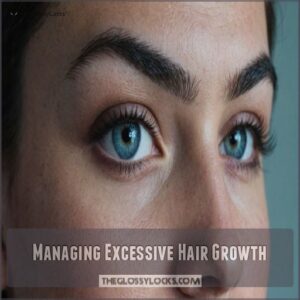This site is supported by our readers. We may earn a commission, at no cost to you, if you purchase through links.
 Excessive hair growth, or hypertrichosis, can indeed be hereditary, thanks to certain genetic factors.
Excessive hair growth, or hypertrichosis, can indeed be hereditary, thanks to certain genetic factors.
If you’ve noticed your family sports a bit more fuzz than others, it might be those genes at play.
This condition often results from genes that should be inactive revving up and causing extra hair growth, harking back to our hairy ancestors.
Imagine your genes just didn’t get the memo that you no longer need that extra warmth.
Understanding your family history can provide clues, but don’t worry, science offers ways to manage it.
Curious about solutions? Stick around and uncover options that might surprise you.
Table Of Contents
- Key Takeaways
- Hypertrichosis and Heredity
- Causes of Excessive Hair Growth
- Types of Hypertrichosis and Heredity
- Genetic Testing and Excessive Hair Growth
- Managing Excessive Hair Growth
- Frequently Asked Questions (FAQs)
- What causes excessive hair growth?
- Why is there hairfall and no regrowth?
- What causes excessive hair growth in female hirsutism?
- Why does my hair grow everywhere?
- What causes excess body hair in people assigned female at birth?
- Can excessive hair growth be treated?
- What is the difference between hypertrichosis and hirsutism?
- What causes hypertrichosis?
- What are the signs and symptoms of hypertrichosis?
- How is hypertrichosis diagnosed?
- How is hypertrichosis treated?
- What are the most important facts to know about hypertrichosis?
- Is excessive hair growth genetic?
- Can hair growth be hereditary?
- Why do I have excessive hair growth?
- What genetic disorder causes hair growth?
- Can diet affect hereditary excessive hair growth?
- Are there lifestyle changes to reduce hair growth?
- How does hormonal imbalance impact hair growth?
- What role do hair removal treatments play?
- Can psychological stress influence hair growth patterns?
- Conclusion
Key Takeaways
- You’ll find that excessive hair growth, known as hypertrichosis, can indeed be hereditary, driven by genetic factors that rev up hair growth genes.
- Your family’s hair growth history often reveals inherited patterns, with certain gene mutations linked to excessive hair development across generations.
- Research suggests that genetic influences, such as those linked to Asian hair growth patterns, can significantly impact hair growth rates. While genetic testing can help identify the specific mutations, environmental factors and hormonal imbalances also play significant roles in hair growth patterns.
- You can manage hereditary excessive hair growth through a variety of treatments, including laser therapy and hormonal interventions, offering effective solutions beyond your genetic predisposition.
Hypertrichosis and Heredity
If you’ve noticed excessive hair growth in your family, you’re likely experiencing hypertrichosis, a genetic condition that can be passed down through generations.
You’ll find that this inherited trait occurs when specific genes controlling hair growth become unusually active, leading to increased hair growth beyond what’s typical for your age, sex, or race.
Role of Genetics in Hypertrichosis
Your genes play a fascinating role in excessive hair growth patterns.
When you inherit certain genetic mutations, they can affect how your hair growth genes function, potentially leading to hypertrichosis.
These inherited traits can influence both the thickness and distribution of your body hair.
Scientists have identified specific DNA variations that control hair follicle development, and they’re continuing to uncover new genetic links to unusual hair growth patterns.
Family History of Hypertrichosis
Looking back through family records often reveals patterns of excessive hair growth passed down from generation to generation.
Family tree analysis reveals how hypertrichosis traits emerge and persist in family lines.
During genetic counseling sessions, medical professionals map out detailed family histories to understand inheritance patterns.
Early signs of familial hair growth patterns help identify hereditary cases, enabling proactive management strategies and informed treatment decisions.
Genetic Predisposition to Excessive Hair
Hair growth patterns often run in families, with genetic factors playing a significant role in determining where and how much hair you’ll develop.
Scientists have identified specific hair follicle genes that influence hair density and distribution.
These inherited traits can affect your hair growth throughout life.
- Genetic testing can reveal inherited markers linked to excessive hair growth
- Family history patterns help predict future hair growth development
- Epigenetic factors may trigger or suppress inherited hair growth genes
Causes of Excessive Hair Growth
You’ll find that excessive hair growth can stem from multiple factors, including your genetic makeup, hormonal changes, and certain medical conditions.
If you’re experiencing unusual hair growth patterns, your genes might be playing a significant role, as inherited traits can influence both the amount and distribution of hair on your body.
Hormonal Imbalances
Inside your body’s complex hormone system, imbalances can trigger unexpected hair growth patterns.
When androgen levels spike due to conditions like PCOS or thyroid dysfunction, you’ll notice thicker hair in unusual places.
Regular hormonal testing helps identify these imbalances early.
Don’t worry – checking stress hormones and tracking thyroid function can help pinpoint the root cause, making treatment more effective.
Genetic Mutations
Your DNA blueprint can harbor genetic predispositions influenced by hormone balance affecting birth control, which also plays a significant role in hair growth. Your DNA blueprint can harbor mutations affecting hair growth genes, leading to conditions like hereditary hypertrichosis.
These genetic changes can disrupt normal hair growth patterns, causing excessive hair in unusual places.
Through modern DNA analysis and genetic testing, you’ll discover if your family history includes specific mutation types linked to hirsutism genetics.
Understanding your genetic predisposition empowers you to make informed treatment choices.
Environmental Factors
While genetic predisposition plays a role in hair growth, environmental factors can trigger or exacerbate excessive hair.
You’re not just a product of your genes; your lifestyle matters too.
Pollution, diet, stress, Climate hair growth solutions can also affect your hair, and medications all influence hair growth patterns.
For instance, certain foods can upset hormonal balance, while stress hormones may stimulate hair follicles.
Understanding these factors helps you take control of your hair growth situation.
Inheritance Patterns of Hirsutism
Genetics play a significant role in hirsutism.
If you’ve got family members with excessive hair growth, you might be more prone to it too.
Hirsutism often runs in families, especially when linked to conditions like PCOS.
Your genes can influence androgen levels, which are key players in hair growth.
Understanding your family history can help you take proactive steps.
Consider genetic counseling to learn more about your risk and potential management strategies.
Types of Hypertrichosis and Heredity
You’ll find various types of hypertrichosis, each with its own genetic influence. Congenital hypertrichosis lanuginosa, congenital hypertrichosis terminalis, and acquired hypertrichosis all have distinct characteristics and potential hereditary factors.
Congenital Hypertrichosis Lanuginosa
From birth, congenital hypertrichosis lanuginosa covers your body in fine, soft lanugo hair.
This rare genetic condition affects hair growth inheritance, persisting beyond the usual shedding period.
Research suggests it’s linked to specific genetic factors.
Key points about this hereditary hair growth disorder:
- Lanugo hair covers most of the body, including face
- Extremely rare, with fewer than 100 cases documented
- No cure, but various treatment options available
- May impact self-esteem and social interactions
Congenital Hypertrichosis Terminalis
Congenital hypertrichosis terminalis is a rare genetic condition that’s present at birth, much like how genetic influence on hair texture plays a significant role in determining individual hair types.
Unlike its lanugo-haired cousin, this form causes thick, dark hair to grow all over your body.
It’s often called "werewolf syndrome" due to its dramatic appearance.
Your genes play a big role here, with specific mutations linked to this excessive hair growth.
Treatment options focus on managing symptoms, as there’s no cure for this inherited trait.
Acquired Hypertrichosis and Genetic Influence
Unlike congenital forms, acquired hypertrichosis develops later in life.
Your genes can still play a role, though.
They might make you more susceptible to triggers like medications or hormonal changes.
Environmental factors can interact with your genetic predisposition, potentially activating hair growth genes.
Epigenetic changes may also influence hair follicle development.
If excessive hair growth runs in your family, you might be more prone to acquired hypertrichosis.
Genetic Testing and Excessive Hair Growth
Genetic testing can reveal your predisposition to excessive hair growth, helping you understand your family’s hair patterns.
It identifies specific gene mutations linked to hirsutism.
It also explores how epigenetics influence hair growth inheritance.
Genetic Testing for Predisposition
Genetic testing reveals the hidden threads of your hair story.
It can reveal your predisposition to excessive hair growth, helping you understand your genetic factors.
For those looking to explore this option, various hypertrichosis genetic test products (hypertrichosis genetic test) are available, offering a starting point for investigation.
This knowledge empowers you to make informed decisions about personalized treatments.
However, consider the ethical implications and cost-benefit analysis before diving in.
As research advances, genetic testing may shed new light on inherited hair growth patterns, potentially revolutionizing how we approach hypertrichosis and hirsutism.
Specific Gene Mutations Linked to Hirsutism
Scientists have identified specific gene mutations linked to hirsutism, shedding light on inherited hair growth patterns.
These genetic factors contribute to excessive hair growth in some individuals.
Research has uncovered three key gene mutations associated with hirsutism:
- CYP21A2: Affects adrenal hormone production
- LHCGR: Impacts ovarian function
- AR: Alters androgen receptor sensitivity
Understanding these mutations through genetic testing for hirsutism can help you and your doctor develop targeted treatment plans, potentially offering better control over unwanted hair growth.
Epigenetics and Hair Growth Inheritance
Your genes aren’t the whole story regarding excessive hair growth.
Epigenetic modifications can influence how your hair growth genes are expressed.
These changes, triggered by environmental factors and lifestyle choices, may explain why family members with similar genes have different hair patterns.
Understanding these epigenetic impacts through genetic testing can provide insights into your hair growth tendencies and help guide personalized treatment plans.
Managing Excessive Hair Growth
Managing excessive hair growth involves various approaches suited to your specific condition and needs.
You’ll find options ranging from long-lasting hair removal techniques to hormonal treatments and genetic counseling, each addressing different aspects of hereditary hair patterns.
Longer-Lasting Hair Removal Options
For those battling excessive hair growth, longer-lasting hair removal options offer a glimmer of hope.
These methods can provide extended relief from unwanted hair, regardless of your genetic predisposition.
One popular choice is Laser Removal, which, while not entirely permanent, reduces hair growth for a long time by targeting hair follicles with intense light, as seen in the process of how laser hair removal works.
Here are three popular choices:
- Electrolysis: Permanent hair removal using electric current
- Laser Removal: Targets hair follicles with intense light
- IPL Treatments: Uses broad-spectrum light to reduce hair growth
While these options can provide extended periods of relief from unwanted hair, regardless of your genetic predisposition.
Hormonal Treatments for Hirsutism’
Ever wondered how hormonal treatments can help manage hirsutism?
These options, like birth control pills or anti-androgens, target hormonal imbalances.
While they may vary in dosage, success can hinge on your family history and genetic predispositions.
Remember, side effects and costs differ.
Here’s a quick comparison:
| Treatment | Side Effects | Cost |
|---|---|---|
| Birth Control Pills | Nausea | Moderate |
| Spironolactone | Dizziness | Low |
| Flutamide | Liver risk | High |
Genetic Counseling for Excessive Hair Growth
After noticing a family history of excessive hair growth, consider genetic counseling.
It helps understand your genetic predisposition to hypertrichosis, identifying potential hair growth genes.
You can also explore options for genetic testing for hair growth patterns through online resources such as Genetic Testing Products.
Genetic counseling explores the ethical implications and benefits, offering personalized strategies.
This approach eases anxieties surrounding family history hirsutism and genetic factors influencing hair growth.
Understanding your family’s hair growth history empowers you to make informed decisions.
Frequently Asked Questions (FAQs)
What causes excessive hair growth?
Imagine hair growing like weeds in a garden; it’s often due to genetic factors, hormonal imbalances, medications, or certain medical conditions.
These elements can cause different types of hair, leading to excessive growth in unexpected places.
Why is there hairfall and no regrowth?
Hair fall with no regrowth often results from genetic factors, hormonal imbalances, stress, or nutritional deficiencies.
Consulting a healthcare professional for a personalized diagnosis can help in finding effective treatments and managing this condition effectively.
What causes excessive hair growth in female hirsutism?
Tackling the mystery of female hirsutism, you’ll find hormone imbalances, often boosted androgens, as the main culprits.
Conditions like PCOS, congenital adrenal hyperplasia, and certain tumors or medications can trigger this unexpected hair growth adventure.
Why does my hair grow everywhere?
Your hair grows everywhere due to factors like genetics, hormonal imbalances, or underlying health issues.
Conditions like hypertrichosis and hirsutism can lead to excess hair growth, varying by what’s natural for your age, race, and gender.
What causes excess body hair in people assigned female at birth?
Hormonal imbalances, like increased androgens, often cause excess body hair.
Excess body hair can also be caused by genetic factors and certain medical conditions.
It’s best to consult a doctor for diagnosis and treatment options.
Can excessive hair growth be treated?
Think of managing excessive hair growth as taming a wild garden.
You can use short-term methods like shaving and waxing, or opt for long-term solutions like laser therapy and electrolysis.
Addressing underlying causes is also very important.
What is the difference between hypertrichosis and hirsutism?
Hypertrichosis is excessive hair growth in any area or pattern, regardless of hormones.
Hirsutism specifically refers to male-pattern hair growth in women due to hormonal imbalances, often involving increased androgen levels like testosterone.
What causes hypertrichosis?
You wonder what triggers hypertrichosis.
It can be genetic, linked to issues at birth, or arise later due to factors like poor nutrition, specific medications, cancer, autoimmune diseases, or chronic skin conditions.
Managing causes helps control symptoms.
What are the signs and symptoms of hypertrichosis?
Around 10% of women experience hirsutism, a form of hypertrichosis, marked by excessive hair growth in unusual areas.
Signs include thick, dark hair on the face, back, or limbs, markedly differing from typical hair patterns.
How is hypertrichosis diagnosed?
Diagnosing hypertrichosis involves a doctor’s thorough examination, considering your medical history and physical signs.
They might assess hormone levels and use questionnaires like the Ferriman-Gallwey scale to evaluate hair patterns, ensuring accurate identification and management.
How is hypertrichosis treated?
Treatment depends on the type. Temporary methods include shaving and waxing. Permanent options are electrolysis and laser hair removal. Underlying conditions need addressing, too.
What are the most important facts to know about hypertrichosis?
Hypertrichosis, a condition with excessive hair growth, can be congenital or acquired.
Congenital forms often link to genetics, while acquired types may stem from health issues or medications.
Treatments focus on symptom management like hair removal.
Is excessive hair growth genetic?
Excessive hair growth can be genetic.
Congenital hypertrichosis, present at birth, often results from genetic factors.
It may run in families, but acquired hypertrichosis typically arises later due to other causes like medical conditions or medications.
Can hair growth be hereditary?
Hair growth can indeed be hereditary.
Genetic predisposition may cause conditions like congenital hypertrichosis, leading to excessive hair growth.
While some cases are inherited, environmental factors and medical conditions also influence hair development patterns.
Why do I have excessive hair growth?
You might notice excessive hair growth due to genetic factors, hormonal imbalances, or conditions like hirsutism or hypertrichosis.
Medications and underlying health issues can also trigger it.
Consulting a healthcare professional can offer guidance.
What genetic disorder causes hair growth?
Imagine rolling a genetic dice—you might end up with congenital hypertrichosis, a disorder causing unusual hair growth from birth.
This genetic condition involves genes that mistakenly reactivate, leading to excessive hair development across various body parts.
Can diet affect hereditary excessive hair growth?
However, maintaining a balanced diet rich in essential nutrients, such as foods to eat for hair growth, can support overall hair health, even if it doesn’t change hereditary patterns. Diet alone won’t alter hereditary excessive hair growth since it’s genetically driven.
However, maintaining a balanced diet can support overall health, possibly influencing other factors like hormone levels, which might indirectly affect hair growth.
Are there lifestyle changes to reduce hair growth?
A balanced diet and stress management can help.
Hormonal imbalances sometimes contribute to excessive hair growth, so consult a doctor if you’re concerned.
Lifestyle changes might lessen the problem, but aren’t a guaranteed solution.
How does hormonal imbalance impact hair growth?
Hormonal imbalances greatly affect hair growth, often increasing it due to elevated androgens like testosterone.
This can lead to hirsutism in women, resulting in male-pattern hair growth.
Managing hormone levels can help control these effects.
What role do hair removal treatments play?
Hair growth around the nipples can be caused by hormonal imbalances, such as an overproduction of male hormones or an increase in androgens like testosterone, leading to hirsutism conditions. Hair removal treatments help manage excessive hair growth by offering temporary or permanent solutions.
Hair removal options like shaving, waxing, and electrolysis reduce unwanted hair, enhancing comfort and appearance while boosting convenience in your daily routine.
Can psychological stress influence hair growth patterns?
Ever wonder if stress makes hairier?
Stress, particularly its chronic type, can affect hair growth patterns.
It disrupts hormone levels, potentially altering hair cycles and causing unexpected changes in hair growth, including temporary loss or excess growth.
Conclusion
Curious if excessive hair growth can be hereditary?
Your family’s bushy history might hold the answer.
With hypertrichosis potentially lurking in your genes, it’s a mix of genetics, environment, and maybe a touch of ancient ancestor flair that could explain the fuzz.
While your genes might want to keep you cozy like your prehistoric relatives, don’t fret—modern science offers solutions.
From genetic testing to laser hair treatments, there’s hope for managing those unexpected hair surprises.












